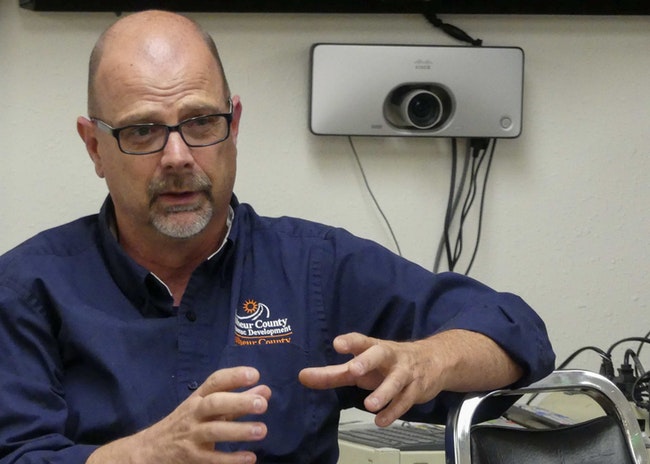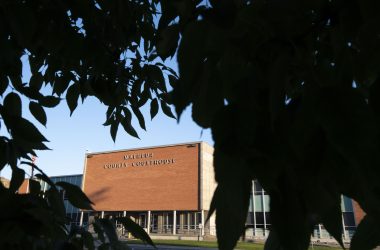
John Braese, an assistant in the Malheur County Economic Development Department, repeatedly told an Ontario company its tax break was in the works when it wasn’t eligible, according to a court complaint. (The Enterprise/File)
Owners of Ontario’s Bluebird Express Car Wash have appealed the denial of a property tax exemption, claiming in a court filing that they were “strung along” by Malheur County economic development officials for months on the promise the exemption was coming.
The appeal filed Nov. 6 with the Oregon Tax Court seeks to overturn the decision last August by Greg Smith, county economic development director, that the company didn’t qualify for the tax break.
County Assessor Dave Ingram on Nov. 13 responded in a court filing that the county’s decision should be upheld because Bluebird’s “business and property are not eligible or qualified for an enterprise zone tax exemption.”
An investigation by the Malheur Enterprise earlier this year established that Smith’s agency repeatedly made false statements to Bluebird executives to indicate the tax break was still in play. Eleven months later, Smith denied the application after state officials interceded to tell Smith a car wash didn’t qualify for the tax exemption.
In its appeal, Bluebird said it had to learn about the denial from the Enterprise.
“Bluebird Express Car Wash found out through the local newspaper that their application was denied without explanation,” the appeal said.
The appeal makes a previously undisclosed claim that Malheur County’s three commissioners each indicated they would support the tax break.
[ KEEP YOUR LOCAL NEWS STRONG – SUBSCRIBE ]
Separately, recent public records requests show that County Judge Dan Joyce was more involved in the matter than previously known and that the county’s economic development agency destroyed key emails documenting issues regarding Bluebird.
Bluebird recounted in its appeal how company officials worked with Smith and his Ontario aide, John Braese, to pursue an exemption from local property taxes. Company executives said earlier this year that their decision to locate and build in Ontario was based in part on expectations they would be spared the taxes.
They got that understanding from Smith and Braese, according to the appeal. The company said it had a conference call with Smith and Braese on Nov. 13, 2018, in which they were given a verbal approval for the tax exemption.
“John Braese was quoted as saying that the application was ‘good to go’ and ‘should be approved for five years exemption,” the claim said. The claim also said that Smith gave the “go ahead” for the company to proceed with its application.
DOCUMENT: Oregon Tax Court filings
That call, the company said in its appeal, served as a “preauthorization conference” required before applications for the tax break can go forward. Such calls function “to prevent investments going forward under mistaken premise, tests the business’s proposed operations are eligible for this designation, and addresses special local approvals in a timely fashion,” the company said.
Over the next 10 months, Bluebird said, it repeatedly sought updates from Smith and Braese on where its application stood.
Bluebird “was unfortunately strung along” by the economic development department, the appeal said.
Bluebird described in its appeal what is said were some of the representations from Braese. It said that on Feb. 25, Braese explained the application wouldn’t go to the Malheur County Court that week because the commissioners would be out of the office, the appeal said. Braese said he “has spoken to all 3 of them personally and he sees no problem in it getting approved,” the appeal said.
Braese, Joyce and Commissioners Larry Wilson and Don Hodge didn’t respond to emails seeking comment on the claim.
The appeal said Braese reported on April 24 that the application was awaiting a signature by BizOregon, the state’s economic development agency. A later investigation by the Enterprise established that the state agency didn’t have the application and had no role in approving it.
Braese also told the company that day that its application “would be on the county court agenda for the following week; it was not,” according to the appeal.
On July 9, Braese “states Bluebird was the only topic on the agenda, and they need more agenda items to convene a meeting” of the county court and then said the application would be considered by the county commissioners on at its July 31 meeting, the appeal. Bluebird discovered its application wasn’t on that agenda, either, the appeal said.
Bluebird said it was also told the application was pending with Malheur County Assessor Dave Ingram but Ingram said that wasn’t so, according to the claim.
Smith wrote a letter dated Aug. 8, notifying the company it didn’t qualify for the tax break.
“On August 8, John Braese delivered news of the denial in person,” the appeal said. “He did not provide details and he did not provide official documentation. Bluebird Express only saw official documentation when a reporter with the Malheur Enterprise reached out with an electronic copy of the denial letter.”
A month later, Smith wrote the company again.
“Malheur County Economic Development apologizes for any information misunderstood or the time frame in which this was handled,” Smith wrote. “We stand ready to assist Bluebird in this venture and any future endeavors.”
In its chronology submitted to the Tax Court, Bluebird cited stories published by the Enterprise and referred to an episode where Malheur County Sheriff Brian Wolfe was asked to consider whether reporting work by the Enterprise constituted a crime.
“Malheur County sheriff finds no crime committed by Enterprise staff while investigating Bluebird’s situation,” the appeal said.
A magistrate with the Oregon Tax Court held an initial hearing on Bluebird’s appeal last week with additional proceedings expected early next year.
Bluebird’s efforts to get the tax break were chronicled in an investigative report by the Enterprise in August.
Subsequently, the Enterprise obtained from Bluebird additional email traffic with the county’s economic development agency that documented previously unknown instances of the company’s effort to learn from Smith and Braese the fate of its application.
In a July 22 email, Mike Fery, the operating partner of Bluebird, asked why the application hadn’t been considered yet by the county commissioners. Braese responded: “County Court is called off for this Wednesday. Your app is scheduled to go one week from Wednesday.”
A week later, Fery reached out to Braese by email, writing, “I was looking at the agenda for Wednesday’s meeting but I don’t see our enterprise zone application.”
There is no record Braese responded, but county court officials said the tax exemption issue was never on a court agenda.
Smith recently explained why that email traffic hadn’t been disclosed to the Enterprise as part of an earlier public records request when the newspaper was investigating the matter.
Regarding the July 22 exchange, Smith wrote, “We do not have record of this email.”
Regarding the July 29 exchange, Smith wrote, “This email is not in our system. It appears we did not retain or respond to this email.”
Smith also couldn’t produce from his agency files an email from Joyce, the county judge, that sought an explanation for what was happening.
Joyce released to the Enterprise a July 31 email from Bluebird’s Mike Fery that recounted the troubles the company had with Smith and his operation. Fery wrote to Joyce after learning that County Assessor Dave Ingram wasn’t the one holding up the tax application, the email indicates.
He said that since submitting the application, “we have dozens and dozens of emails from John stating that ‘we are on next week’s agenda,’ ‘they have moved your item from the agenda to next week,’ the ‘meeting was canceled,’ etc. Early on, he even tried to say that he was waiting on Dave (after a call with Dave this morning I now know that to be another terrible excuse as Dave never received anything from them).”
He asked to meet with Joyce. Joyce sent the complaint to Smith.
“I am sure there must be an explanation in the works somewhere?” Joyce wrote to Smith in sending along Fery’s message.
That exchange is gone from the economic development agency’s files, Smith said.
“We chose to not retain nor respond in written form to this email,” Smith explained in a letter in October.
A month later, Smith said that “the notion that an email may have been unknowingly deleted or lost is possible. Malheur County Economic Development did not knowingly destroy, mutilate, conceal, remove or make a false entry in or falsely alter any public record(s).”
Smith said that his agency “retained an IT professional to review our system and locate the items questioned.”
He subsequently said there was not a single record documenting that effort or the results, and that communication with the professional was all verbal and there was no payment for the help.
News tip? Contact reporter Pat Caldwell at [email protected] or reporter Yadira Lopez at [email protected].
Previous coverage:
For Ontario car wash, hopes of a tax break from Malheur County end in stunning denial




